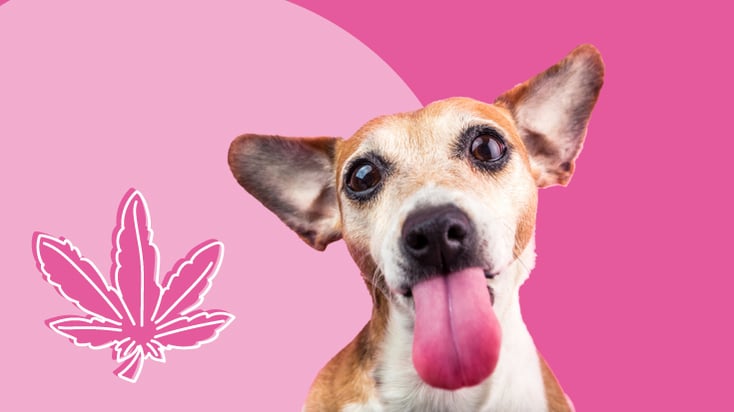My Dog Ate Marijuana, What Should I Do?

Table of Contents
The change of regulations on the use of marijuana or cannabis in some places has made it more accessible to people and, by default, pets. As a result, incidents of marijuana ingestion in pets are on the rise. In 2019, the Animal Poison Control Center (APCC) reported a 765% increase in calls regarding marijuana consumption in pets.
While accidental ingestion of marijuana is rarely fatal, the herb contains tetrahydrocannabinol (THC), a psychoactive substance that can profoundly affect your dog's health. This is because dogs have more cannabinoid receptors in their brains, making marijuana intoxication more harmful to them than humans.
If your dog ate marijuana, symptoms will typically show within 1 to 3 hours and may worsen progressively making it important to act quickly to prevent the marijuana toxicity from worsening
Key Takeaways:
- Accidental marijuana ingestion is becoming increasingly common in pets, particularly dogs.
- Marijuana can be dangerous for dogs, causing physical symptoms and extreme anxiety.
- If you suspect your dog has ingested marijuana, it is important to contact your veterinarian immediately for guidance and potential treatment.
Follow these three essential steps to respond quickly in this situation.
1. Determine the Type
The first thing to do if you think your dog accidentally ate marijuana is to determine the type. While THC is present in both smoked marijuana and food products, the concentration and toxicity are greater in foods. Marijuana flower buds, for example, contain less than 10-30% THC — hence, symptoms are less than if your dog ate a whole batch of THC-laced brownies, which often have a much higher and concentrated THC content.
2. Contact Your Veterinarian and Decide on Immediate Care
Next, you must contact your veterinarian and provide as much information as possible about the incident. Your veterinarian must know your pet's body weight and how much THC your pet has ingested. Tell your vet if your dog ate edibles, and give them the full ingredient list, as edibles may contain potentially dangerous substances.
Your veterinarian will then give you directions on beginning supportive care for your dog – if your pet is to be treated as an outpatient at home – or arrange to examine the dog in person if they display severe symptoms or have ingested marijuana alongside particularly dangerous substances like chocolate or xylitol – an artificial sweetener. This is because while ingesting only marijuana is rarely fatal for dogs, these other substances are highly toxic to dogs.
During the in-person visit, the doctor will conduct a thorough physical examination, decide on the necessity of laboratory tests, and evaluate the dog's symptoms to determine the most suitable treatment. Treatment recommendations can range from inducing vomiting to specialized interventions like intravenous fluid therapy, which requires hospitalization.
Remember to prioritize safety: if there is nobody available to drive who is not under the influence of marijuana, arrange for a ride or an in-home vet appointment (if symptoms are mild).
Is Your Pet Feeling Under the Weather?
Get the care your pet needs without leaving home. We have same-day appointments in most locations when it can’t wait.
3. Give Supportive Care
Supportive care involves keeping your pet in a warm, enclosed area, such as a crate or room, and checking on them frequently to ensure symptoms are not worsening. Also, reduce sensory stimuli, keep your dog hydrated, and monitor their temperature. Additionally, keep your dog clean and dry if they are experiencing urinary incontinence.
How Can I Tell if My Dog Ingested Marijuana?
THC toxicity symptoms occur in cases of marijuana poisoning and are associated with some specific clinical signs. It is important to familiarize yourself with these warning signs and seek immediate veterinary care for your dog if any marijuana ingestion effects appear. Here are a few common symptoms to help you tell if your dog is suffering from cannabis toxicity.
- Excessive drooling
- Dilated pupils
- Lethargy
- Sensitivity to loud noises
- Excitation or agitation
- Incoordination or loss of balance
- Vomiting
- Urinary incontinence
- Low body temperature
- Low blood pressure
- Shaking or seizures
If you are attempting supportive care, observe for symptoms like excessive vomiting, low body temperature, or seizures, as these are considered an emergency and require immediate medical attention.
Conclusion
This guide has walked you through what to do if your dog eats weed. While marijuana ingestion is becoming increasingly common in dogs, it is rarely fatal unless consumed with other substances like chocolate and xylitol, which are toxic to dogs.
Contact your veterinarian immediately if there is a possibility that your dog ate weed. You will need to get your dog seen by the veterinarian if symptoms are severe.
Should My Pet Be Seen by a Veterinarian?
1. Have you noticed changes in your pet’s appetite?
2. Does your pet have diarrhea or loose stools?
3. Have you noticed changes in your pet’s thirst/water consumption?
4. Is your pet having accidents in the house?
5. Is your pet pacing and unable to settle?
6. Is your pet panting more than usual?
7. Is your pet whining or vocalizing more than usual?
8. Is your pet shaking more than usual?
9. Is your pet hiding or avoiding physical contact more than usual?
10. Is your pet more lethargic and sleeping more than usual?
11. Are you concerned about changes in your pet’s behavior?
12. Is your pet scratching their ears?
13. Is your pet licking their paws more than usual?
14. Does your pet have a rash?
15. Is your pet moving more slowly than usual or having a harder time getting up or down?
View Results
Should My Pet Be Seen by a Veterinarian?
1. Have you noticed changes in your pet’s appetite?
2. Does your pet have diarrhea or loose stools?
3. Have you noticed changes in your pet’s thirst/water consumption?
4. Is your pet having accidents in the house?
5. Is your pet pacing and unable to settle?
6. Is your pet panting more than usual?
7. Is your pet whining or vocalizing more than usual?
8. Is your pet shaking more than usual?
9. Is your pet hiding or avoiding physical contact more than usual?
10. Is your pet more lethargic and sleeping more than usual?
11. Are you concerned about changes in your pet’s behavior?
12. Is your pet scratching their ears?
13. Is your pet licking their paws more than usual?
14. Does your pet have a rash?
15. Is your pet moving more slowly than usual or having a harder time getting up or down?
Share Quiz
Frequently Asked Questions
Is marijuana ingestion in dogs common?
Accidental ingestion of marijuana is common in dogs, especially because they are not picky eaters. Additionally, according to results from an online survey of 251 veterinarians in the U.S. and Canada, marijuana toxicity is most commonly reported in dogs (226 veterinarians).
Can marijuana affect dogs differently based on their size or breed?
Size is a significant determinant of how much marijuana affects dogs. Marijuana can have a greater impact on puppies or small breeds than it would a larger dog.
What should I do if I'm unsure whether my dog ingested marijuana or not?
If you are unsure, consult your veterinarian immediately.
How can I prevent my dog from ingesting marijuana?
To prevent your dog from ingesting marijuana, pay attention to what your dog eats and keep marijuana products in a tight container or a locked cabinet. Additionally, keep your dog leashed during walks unless you are sure you are in a dog-friendly area. Lastly, dispose of marijuana products properly.
How long does marijuana toxicity last in dogs?
Generally, symptoms of marijuana toxicity resolve within a day or two. However, it may take longer if symptoms are severe or if your dog ingested synthetic marijuana, also known as spice or fake marijuana.
Can a dog die from eating weed?
While marijuana itself rarely has fatal outcomes for dogs, the prognosis is worse for dogs who eat edibles because of the other ingredients they contain. Fast action and honest communication with your veterinarian is the best way to help your dog.






